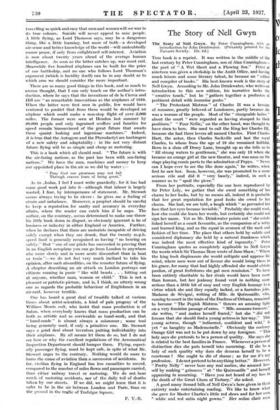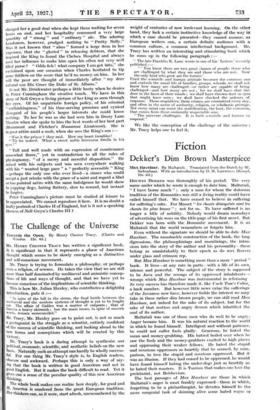The Story of Nell Gwyn
Tins book is a reprint. It was written in the middle of the last century by Peter Cunningham, son of Alan Cunningham-- the poet of " A Wet Sheet and a Flowing Sea." Peter at nineteen was given a clerkship in the Audit Office, and having much leisure and some literary talent, he became an " editor and compiler of books." His best-known work is the story of Nell Gwyn. According to Mr. John Drinkwater, who writes an introduction to this new edition, his narrative lacks the " creative touch," but he :` gathers together a profusion of pertinent detail with immense gusto."
" The Protestant Mistress " of Charles II was a heroine of romance, greatly beloved of Londoners, partly because she was a woman of the people. Most of the " chargeable ladies '' about the court "were regarded as having stooped to their positions." " Poor Nellie," on the other hand, was thought to have risen to hers. She used to call the King her Charles III, because she had three lovers all named Charles. First Charles Hart, the actor, then Charles Sackville and last the royal Charles, to whom from the age of 19 she remained faithful. Born in a slum off Drury Lane, brought up as she -tells us to " fill strong waters to gentlemen," she was only 13 when she became an orange girl at the new theatre, and was soon on the stage playing comic parts to the admiration of Pepys. " Never can I hope ever to see the like done Again," he writes, when first he saw her. Soon, however, she was promoted to a more serious role and did it " very basely," indeed, in such a manner as to " spoil the piece."
From her portraits, especially the one here reproduced by Sir Peter Lely, we gather that she owed something of her charm to her looks, but by no means all, indeed it is probable that her great reputation for good looks she owed to her charm. She had, we are told, a laugh which " so pervaded her face that her eyes became invisible." Probably she could read, how else could she learn her words, but certainly she could not sign her name. Yet as Mr. Drinkwater points out " she estab- lished herself as a court favourite, as the companion of a witty and learned king, and as the equal in, acumen of the rank and fashion of her time. The place that others held by subtle and considered diplomacy she held by a natural frankness which was indeed the most effective kind of ingenuity." Peter Cunningham quotes as completely applicable to Nell Gwyn the words which Sir Thomas More wrote of Jane Shaw, " Where the king took displeasure she would mitigate and appease mind, where men were out of favour she would bring them in his grace, for many that had highly offended she would obtain pardon, of great forfeitures she gat men remission." To have been entirely charitable to her rivals would have been more than human, but her jealousy found vent in nothing more serious than a little bit of easy and very English homage to a virtue which she and they equally lacked, or a harmless joke. Madame de Sevigne, writing of Mlle. de Querouaille, who, coming to court in the train of the Duchess of Orleans, remained to become " The Popish Mistress " throws an amusing light on a very feminine passage of arms. " Mlle. amasses treasure," she writes, " and makes herself feared,'.' but she " did not foresee that she should find a young actress in her way." This young actress, though " indiscreet, confident and wild,- a yet " as haughty as Mademoiselle." Obviously the cockney Orange Girl was not to be put down by any foreigner. " This lady says she pretends to be a person of quality. She says she is related to the best families in France. Whenever a person of distinction dies she puts herself into mourning. If she be a lady of such quality why does she demean herself to be a courtesan ? She ought to die of shame ; as for me it's my profession. I do not pretend to be anything better." However, " Pretty Nelly " never bore any real malice, she amused her- self by making " grimaces " at " the Querouaille " and herself appearing in mourning. " Have you not heard of my loss in the death of the Great Cham of Tartary," she asked. , A good many itemed bills of Nell Gwyn's here given in their entirety make entertaining reading. We like to know what she gave for Master Charles's little red shoes and for her owl) !' white and red satin night gowns." Her sedan chair men
charged her a good deal when she kept them waiting for seven hours on end, and her hospitality consumed a very large quantity of " strong " and " ordinary " ale. The adoring Londoners, however, grudged nothing to " Pretty Nelly." Was it not known that " alms " formed a large item in her expenses, that she " gloried " in releasing debtors, that she inspired the King to found the Chelsea Hospital and always used her influence to make him open his often not very well filled purse ? " Odds &A ! what company I am got into," she exclaimed upon one occasion when Charles hesitated to tip some fiddlers on the score that he'd no money on him. In her will the poor are thought of immediately after " my dear natural son His Grace the Duke of St. Albans."
Is not Mr. Drinkwater perhaps a little hasty when he denies to Peter Cunningham the creative touch. We have in this story of Nell Gwyn a living picture of her king as seen through her eyes. Of his unpatriotic foreign policy, of his criminal " unthinldngness," of his time-serving promises and cynical disregard of his people's larger interests she could know nothing. To her he was as she had seen him in Drury Lane Theatre when she spoke to him the best words of her best part (Beaumont and Fletcher's Humorous Lieutenant). She is in poor attire amid a mob, when she sees the King's son :— " Was it the prince ? they said. How my heart trembles!
"'Tis he indeed. What a sweet noble fierceness dwells in his eyes !"
" Tall and well made with an expression of countenance somewhat fierce," yet in contradiction to all the rules of physiognomy, " of a merry and merciful disposition." He mixed with his subjects and was seen everywhere walking with his " wonted large pace " a " perfectly accessible " King —perhaps the only one who ever lived—a sinner who could accept a just rebuke with the grace of a saint and regard a libel or too pointed satire with the same indulgence he would show to yapping dogs, hating flattery, slow to reward, but instant to forgive.
Peter Cunningham's picture must be studied at leisure to be appreciated. We cannot reproduce it here. It is no doubt a faulty portrait of Charles H of England, but is it not a speaking likeness of Nell Gwyn's Charles III.?











































 Previous page
Previous page